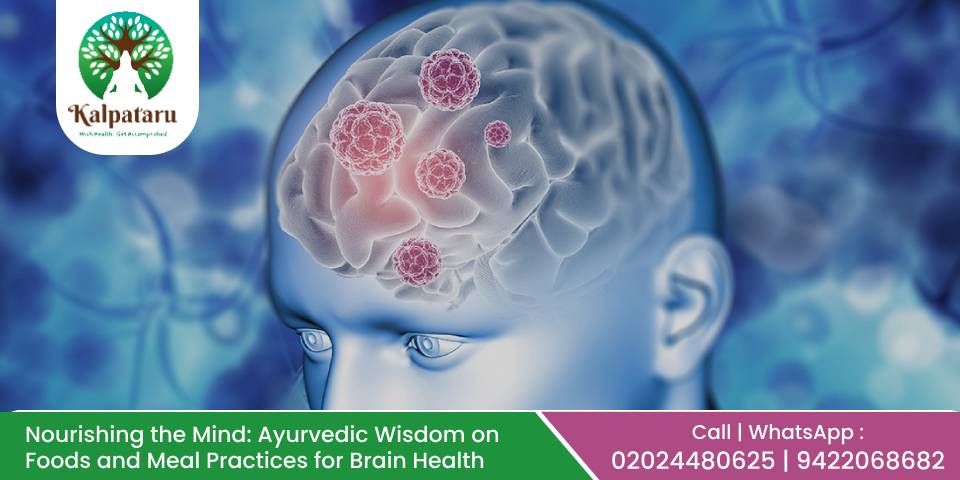In the bustling chaos of modern life, our minds often bear the brunt of stress, multitasking, and sensory overload. Just as we nourish our bodies, it’s crucial to tend to the health of our brains, which serve as the command center for our entire being. Ayurveda, the ancient Indian system of medicine, offers a treasure trove of wisdom on how we can support and enhance brain health through our diet and meal practices. Let’s delve into the world of Ayurvedic nutrition and explore the foods and meal guidelines that are revered for their ability to nourish and rejuvenate the mind.
Understanding Ayurveda and Brain Health:
Ayurveda views the human body as a microcosm of the universe, consisting of the same elemental building blocks: space (akash), air (vayu), fire (agni), water (jala), and earth (prithvi). When these elements are in balance within us, we experience optimal health. Imbalances, however, can lead to various ailments, including those affecting the mind.
In Ayurveda, the mind is intricately connected to the doshas – Vata, Pitta, and Kapha – which govern different physiological functions. When these doshas are in harmony, mental clarity, focus, and emotional stability prevail. Conversely, imbalances can manifest as anxiety, depression, or cognitive fog.
The Role of Food in Ayurveda:
Ayurveda emphasizes the importance of food not only as sustenance but as medicine. Every morsel we consume has the potential to either nourish or disrupt the delicate balance of our doshas. By selecting foods that align with our unique constitution and current state of being, we can promote overall well-being, including mental health.
Foods for Brain Health in Ayurveda:
- Ghee (Clarified Butter): Ghee is revered in Ayurveda for its ability to nourish the brain and nervous system. Rich in fat-soluble vitamins and essential fatty acids, ghee supports cognitive function, memory, and mental clarity. Consuming a teaspoon of ghee daily, particularly in the morning, is believed to enhance intellect and promote emotional stability.
- Nuts and Seeds: Almonds, walnuts, sesame seeds, and pumpkin seeds are packed with nutrients essential for brain health, including omega-3 fatty acids, vitamin E, and antioxidants. These nuts and seeds nourish the nervous system, enhance memory, and support overall cognitive function. Ayurveda recommends soaking nuts and seeds overnight to improve digestibility and nutrient absorption.
- Turmeric: Renowned for its potent anti-inflammatory properties, turmeric is a staple in Ayurvedic cooking. Curcumin, the active compound in turmeric, crosses the blood-brain barrier, where it exerts neuroprotective effects. Consuming turmeric regularly can help prevent cognitive decline, support mood balance, and enhance brain function.
- Brahmi (Bacopa monnieri): Brahmi is a revered herb in Ayurveda known for its profound impact on cognitive function and mental clarity. It enhances neurotransmitter function, improves memory retention, and promotes a calm and focused mind. Brahmi can be consumed as a supplement or infused into teas and tinctures for maximum benefit.
- Saffron: Saffron, the world’s most expensive spice, is cherished in Ayurveda for its ability to uplift the mood and enhance cognitive function. It contains compounds that stimulate the production of neurotransmitters like serotonin and dopamine, promoting feelings of well-being and mental acuity.
Ayurvedic Meal Practices for Brain Health:
In Ayurveda, how we eat is as important as what we eat. Here are some key meal practices to support brain health:
- Eat Mindfully: Ayurveda emphasizes the importance of mindful eating. Slow down, savor each bite, and chew your food thoroughly. This allows for better digestion and absorption of nutrients, ensuring that your brain receives the nourishment it needs.
- Favor Warm, Cooked Foods: Warm, cooked foods are easier to digest and are gentler on the digestive system. Prioritize soups, stews, steamed vegetables, and cooked grains in your meals to support optimal digestion and nutrient assimilation.
- Follow Regular Meal Times: Establishing regular meal times helps regulate your digestive fire (agni) and promotes a sense of stability and routine. Aim to eat your meals at roughly the same times each day, allowing for adequate gaps between meals for digestion.
- Avoid Overeating: Overeating can overwhelm the digestive system and lead to sluggishness and lethargy, affecting both body and mind. Eat until you are satisfied, but not overly full, and listen to your body’s hunger and satiety cues.
- Stay Hydrated: Proper hydration is essential for brain function and overall well-being. Sip warm water throughout the day to support digestion and hydration without dampening your digestive fire.
Conclusion:
By incorporating brain-nourishing foods into your diet and embracing Ayurvedic meal practices, you can nourish your mind and support optimal brain health.
There are so many herbs which are proven to boost brain functions by means of better cognition, memory enhancement, stress relief such as Brahmi, Jatamansi,Shankhpushpi , Jyotishmati etc. Many panchkarma allied procedures such as takradhara, shirodhara , nasya are proved to be very effective for improving brain functions.
Remember, true health is a holistic endeavor that encompasses body, mind, and spirit. Cultivate a deeper connection to yourself and the world around you through the wisdom of Ayurveda, and experience the profound benefits of holistic well-being.

